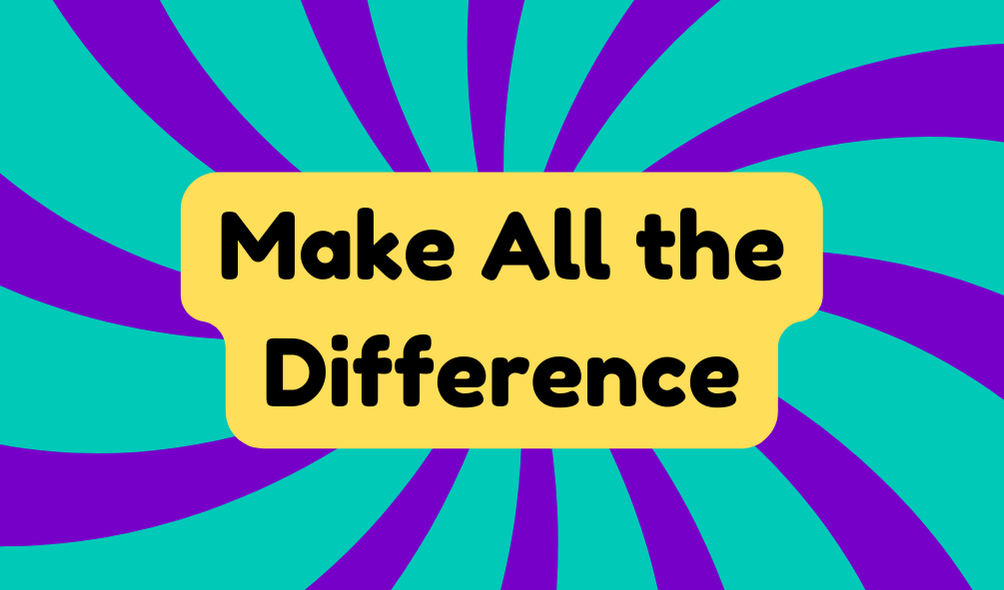"Make all the difference" often highlights how small actions can lead to significant changes. While people commonly relate it to kindness or support, such gestures can be complex. Not every nice act produces a positive outcome; intentions matter. For instance, a simple smile may brighten someone's tough day, while an ill-timed comment can harm. This phrase dates back to the 1500s and appears in the Bible, illustrating its long-standing relevance. Today, amidst global challenges, every contribution counts. Recognizing the power of language can influence how we inspire change. There's much more to uncover about this impactful concept.
Synonyms
When we talk about making a difference, several synonyms come to mind that capture its essence. You might think terms like "impact," "influence," and "change" can convey the same idea, but do they really illustrate the depth of a significant impact or a positive influence? Consider these nuanced terms that reflect the complexity of the act:
- Advancement
- Transformation
- Contribution
- Enhancement
Each of these words embodies various ways to affect outcomes, yet they don't all capture the immediate necessity for improvement. It's important to recognize that not every influence results in positive change. As you explore these words, keep in mind the weight they carry and the change they promise. Your exploration can guide you in making purposeful decisions that truly resonate.
Example of Sentences
In moments that seem small yet carry significant weight, your words or actions can truly make all the difference. Think about how impactful actions can shape experiences for the better. Consider these examples:
- A mother's phone call before an interview provides incredible support.
- Friends' presence at graduation can uplift spirits beyond expectation.
- Donations to a local charity reflect meaningful support that transforms lives.
- A simple smile might brighten someone's tough day with lasting effects.
These sentences remind us that even minor gestures can yield major outcomes. So, when you act with intention, remember that the little things—those unexpected moments—often pave the way for change. Your ability to engage with empathy and purpose sets the groundwork for positive transformation.
Origin
The idiom "make all the difference" has roots that stretch back to the 1500s, illustrating its longstanding relevance. In its historical context, this phrase first appears in the Bible, specifically the Book of Leviticus, Chapter 11, Verse 47. Here, it is used to differentiate between clean and unclean animals, highlighting how contrasting elements lead to significant distinctions. This insight reflects humanity's enduring fascination with how small changes can create lasting impacts. By recognizing these biblical references, you can appreciate how this idiom encourages you to aim for improvement in various aspects of life. It is crucial to question whether the phrase's simplistic nature truly encapsulates the complexity of change or merely serves as an oversimplified rallying cry for innovation.
Collocations
Understanding the phrase "make all the difference" naturally leads to exploring its collocations, which enhance its meaning and application in everyday language. Collocations add depth by connecting ideas like impact assessment and positive reinforcement, illustrating how small changes can create significant effects.
- Make a substantial difference
- Make a meaningful impact
- Make a positive change
- Make a lasting impression
Recognizing these collocations allows you to communicate more effectively. They emphasize how one action, however small, can shift dynamics towards improvement. When discussing any situation, be mindful of the language you use, as the right collocation can clarify your message and inspire others. Integrating these phrases into your vocabulary can transform your discussions, encouraging innovative thinking.
How to Use in Everyday Language
Using the phrase "make all the difference" can elevate your conversations and convey powerful messages. You can sprinkle it into your daily dialogues to emphasize the everyday impact of small actions. For instance, saying that a simple compliment can make all the difference in someone's day highlights positive change rooted in kindness. In meetings, illustrate how a strategy tweak could make all the difference in project outcomes. However, don't overuse it; guarantee it feels genuine and relevant. The goal is to invoke awareness of how even minor efforts can shift perspectives and create meaningful results. By doing this, you'll inspire others to recognize their potential for making a difference, contributing to a culture of positivity and improvement.
Why Is It Still Relevant Today?
In a world filled with challenges and uncertainties, the phrase "make all the difference" remains profoundly relevant. Today, as we face ongoing social, environmental, and economic issues, our actions can still drive impactful changes. You don't have to be a leader to create lasting impressions; small acts of kindness and innovation can ripple through communities. Whether it's offering a supportive word to a friend or volunteering for a local cause, every contribution counts. However, it's essential to realize that not all efforts yield immediate results. Sometimes, change feels slow or insignificant. Yet, consistent positivity and engagement pave the way for genuine transformations. Embrace this phrase, and remember: even small actions today can build a better tomorrow for everyone.







